Can Mollies Eat Ants, Bug Bites And Houseflies? A Safety Guide for Fish Owners [Avoid these 4 Insects]
As a fish owner, you may ask if aquatic pets like Mollies (Poecilia sphenops) can safely eat ants and protein-rich insects. This article will analyze the risks of feeding ants and insects to your 2-3 cm mollyfish.
Ants and other terrestrial insects contain beneficial nutrients like “protein (18%-25%), fat (7%-12%), and trace minerals”. However, their hard external skeletons may injure Molly’s digestive tract. Additionally, ants can transmit diseases or contain pesticides from environmental exposure. Of 152 ant species in North America, fewer than 15% are generally safe for Mollies to eat.
Safer insect options include soft-bodied worms and larvae found in fresh water. For example, mosquito larvae (Culicidae spp.) offer lots of protein without the digestive risks. A balanced, prepared fish food containing 36%-42% protein is ideal for Molly’s health. Supplement no more than 10% of their diet with wild-caught insects after identifying them as safe.
When in doubt, avoid feeding Mollies insects from unknown sources. With some precautions, insects can provide benefits, but Molly owners must research safety first.
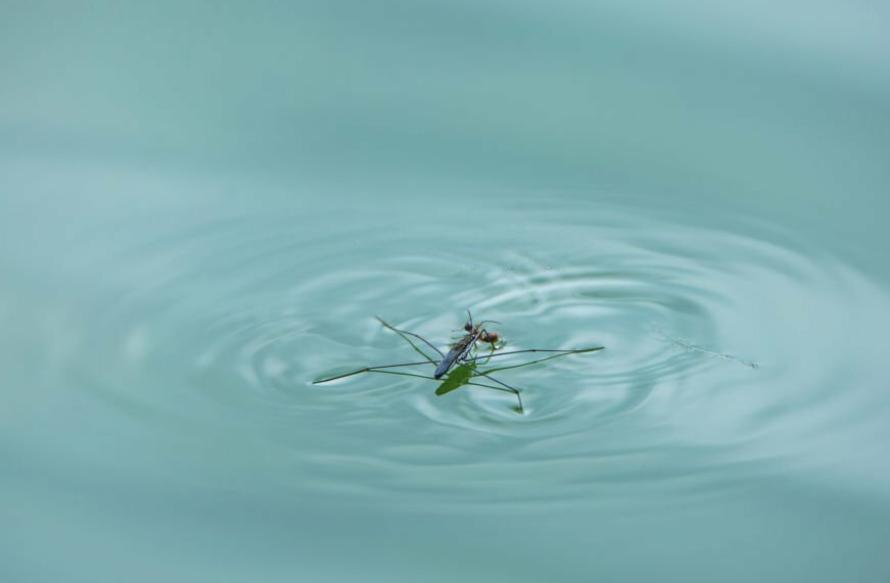
Table of Contents
- Is Ants Toxic To Aquarium Life?
- Risk of Molly eating an ant
- Mollies and Bug bites
- Do mollies eat houseflies?
- Can Molly eat mosquitoes?
- Can Mollies eat any insects?
- Do Mollies eat bugs?
- Can I feed my Mollies termites?
- Insects safe for Mollies to eat
- Can I feed any ants to my fish?
- Conclusion
Is Ants Toxic To Aquarium Life?
Yes. Ants can be toxic to Mollies and other aquarium life. Here are some key reasons:
- Venom and Acid – Some ant species have venomous stings or spray formic acid as a defence. Getting this insect venom/acid in an aquarium poses toxicity risks to inhabitants.
- Pesticides – Ants entering from outside could carry pesticide residue on their bodies from environmental exposure. These chemicals are dangerous to aquatic life.
- Pathogens – If introduced, ants and terrestrial insects may transmit unfamiliar bacteria, viruses, protozoa or other microbes hazardous to tank inhabitants.
- Hard Shells/Body Parts – The tough exoskeletons, sharp mandibles and spiky legs of ants present physical injury and choking hazards to tank life like mollies.
So, ants should be kept entirely out of aquariums containing “mollies, platies, goldfish and other common pet fish”. Their venom, microbes, pesticides and body parts introduce risks incompatible with closed aquatic environments. Removing ants is crucial to prevent harm. While some insects can supplement diets, ants specifically threaten tank safety.
Risk of Molly eating an ant
While ants may seem small enough to eat, their hard outer shells and body segments can pose serious health risks for Mollies or other small aquarium fish.
- Intestinal Blockage or Damage – The Molly’s intestines could become blocked or injured from trying to pass the ant’s hard, sharp body segments. This could lead to digestive problems and may even be fatal.
- Toxins or Pesticides – Outdoor ants may contain “formic acid and venom or have trace pesticide exposure. Ingesting even one contaminated ant could sicken or endanger your Molly.
- Choking Hazard – If an ant’s body gets lodged in the throat or gills, it could result in choking or breathing issues for your Molly. This is incredibly dangerous.
- Behavioural and Immune Stress – Molly may be stressed and exhibit less typical social behaviours. Trying to pass the ant could tax the immune system and increase disease susceptibility.
Therefore, Mollies are never safe or recommended to eat ants or other hard-shelled insects intentionally. If you notice your Molly eating an ant accidentally, monitor them closely for 3-5 days for signs of distress or breathing issues. Remove ants from any habitat immediately to prevent further hazards.
Mollies and Bug bites
Mollies do not eat commercial fish foods like bug bites or fish flakes formulated for other aquarium fish. While their pectoral fins and streamlined bodies allow quick evasion, Mollies have different dietary needs.
Instead, Mollies are insectivores that thrive best on a carnivorous diet rich in animal matter. In the wild, they eat small aquatic invertebrates like mosquito larvae and copepods. As you noted, terrestrial insects can introduce pathogens and should be avoided.
When feeding mollies, it’s best to use a high-quality Molly fry food or small-granule preparation for livebearers. Look for feeds containing at least 36% protein from quality fish meal, shrimp meal, spirulina, and other wholesome ingredients. Supplement with occasional treats like boiled vegetables or larvae from pesticide-free areas.
With a species-appropriate diet optimized for their nutritional preferences, Mollies will display vibrant colours and vigorous activity. Their specialized needs prevent enjoyment of generalized flakes or antiparasitic bug bites marketed toward larger community fish. Meet their dietary requirements, and your Mollies will thrive.
Do mollies eat houseflies?
No. Mollies should not eat house flies or other flies. While flies contain ample protein, their hard external shell poses a significant choking hazard and can damage Molly’s digestive tract. House flies (Muscidae family) can particularly transmit dangerous bacterial pathogens like Salmonella and E. coli if ingested.
No flies are safe for Molly’s consumption – their tough exoskeletons present an impalement risk during swallowing. As insects, they may have come into contact with insecticides or environmental toxins very harmful to fish.
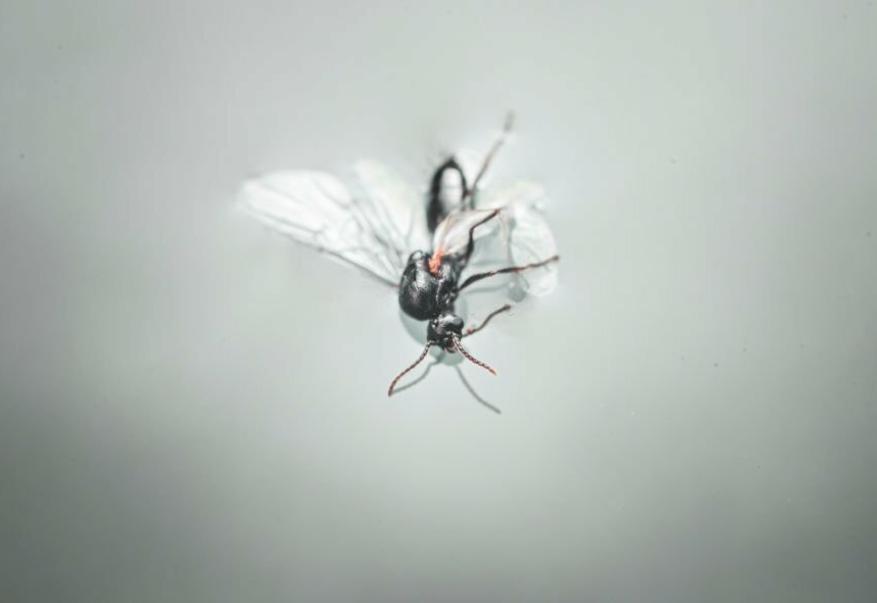
Instead of flies, feed Mollies high-quality prepared food containing soft-bodied ingredients like “shrimp, fish meal, spirulina, and vegetation“. Use safe live foods like mosquito larvae, daphnia, or blackworms collected from uncontaminated freshwater areas to supplement. These won’t pose digestion or poisoning dangers.
Feeding flies may seem convenient, but it is important to note that no flies or terrestrial insects should intentionally feed Mollies or aquarium fish. Doing so poses immediate health hazards and can seriously endanger your pets if accidentally ingested. For their safety, preclude flies from any Molly environment.
Can Molly eat mosquitoes?
Yes. Mollies can and should eat mosquito larvae. While adult mosquitoes prey on blood, their aquatic juvenile larvae provide mollies with nutritious live food. Mosquito larvae belong to the Culicidae family of insects.
Unlike terrestrial insects, mosquito larvae have soft bodies without an external skeleton or shell. This means Mollies can safely eat them without posing any impalement or choking hazards.
Mosquito larvae are a great supplemental food high in proteins and nutrients. They contain all the amino acids required for good Molly health. Just be sure only to collect larvae from pesticide-free freshwater areas.
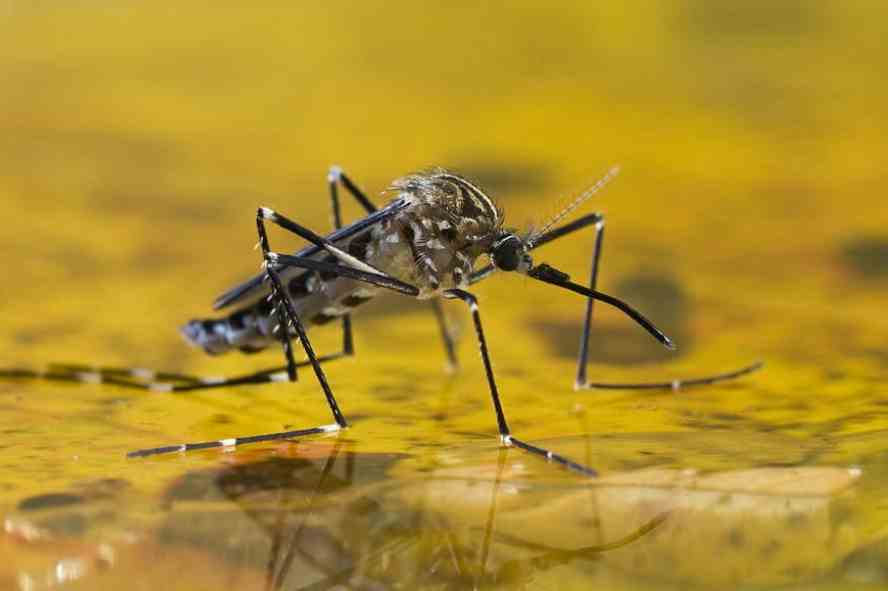
Along with other small aquatic invertebrates like daphnia and copepods, mosquito larvae should compose up to 20% of Molly’s diverse diet. High-quality Molly pellets should be the dietary staple.
So, contrary to popular belief, mosquito larvae are perfectly healthy and digestible for Molly’s consumption. Their soft bodies provide nutrients without harming the digestive tract. In moderation, they make an excellent addition to a balanced Molly diet.
Can Mollies eat any insects?
No. Mollies cannot safely eat just any insect. While insects can provide beneficial nutrition, many have hard shells and body parts that pose significant health hazards to Mollies and small fish.
- Beetles – Their tough external wing covers, and strong jaws present digestion risks.
- Crickets – Large legs and spikes are dangerous when eaten.
- Flies – No flies are truly safe due to tough exoskeletons.
- Ants – Their segmented bodies and stingers can damage Molly’s intestines.
The only insects Mollies can safely eat are small aquatic invertebrates like:
- Mosquito larvae
- Aquatic sowbugs
- Daphnia
- Blackworms
These species have entirely soft bodies without dangerous spikes or shells. Even then, only feed Mollie’s insects collected from pesticide-free freshwater to prevent poisoning.
While many insects appear small enough for mollies, the hazards of hard parts or toxins make the risks outweigh any benefits. For their health and safety, Mollies should never intentionally be fed terrestrial beetles, crickets, ants, or flies under any circumstances. Soft-bodied aquatic larvae are the only insect option.
Do Mollies eat bugs?
No. Mollies do not eat bugs or terrestrial insects like ants. As small freshwater fish, Mollies eat food naturally occurring in aquatic environments, not land bugs. Their specialized diet consists mainly of tiny invertebrates like mosquito larvae, daphnia, copepods or moina. These microscopic water-dwelling organisms have soft bodies easily digested by mollies.
Ants and other land-based insects have hard exoskeletons and body parts that could damage Molly’s digestive tract. Additionally, some ants contain formic acid or venom that is toxic to fish. Any pesticide exposure poses poisoning risks as well.
Insects such as dragonflies, beetles, or thrips end up in freshwater, but mollies should not intentionally eat these species either. Their legs, wings, and eye facets are unsafe as swallowable food sources.
In short, Mollies only eat tiny aquatic invertebrates – never terrestrial insects or land-dwelling bugs. These organisms don’t naturally appear in their native habitat or diet. Feeding Mollies insects like ants can cause serious health issues and should always be avoided for their safety.
Can I feed my Mollies termites?
No. It would help if you never fed termites to mollies. Termites are wood-dwelling insects with hard, woody exoskeletons and sharp mouthparts specialized in chewing wood and cellulose. Their bodies pose multiple dangers if eaten.
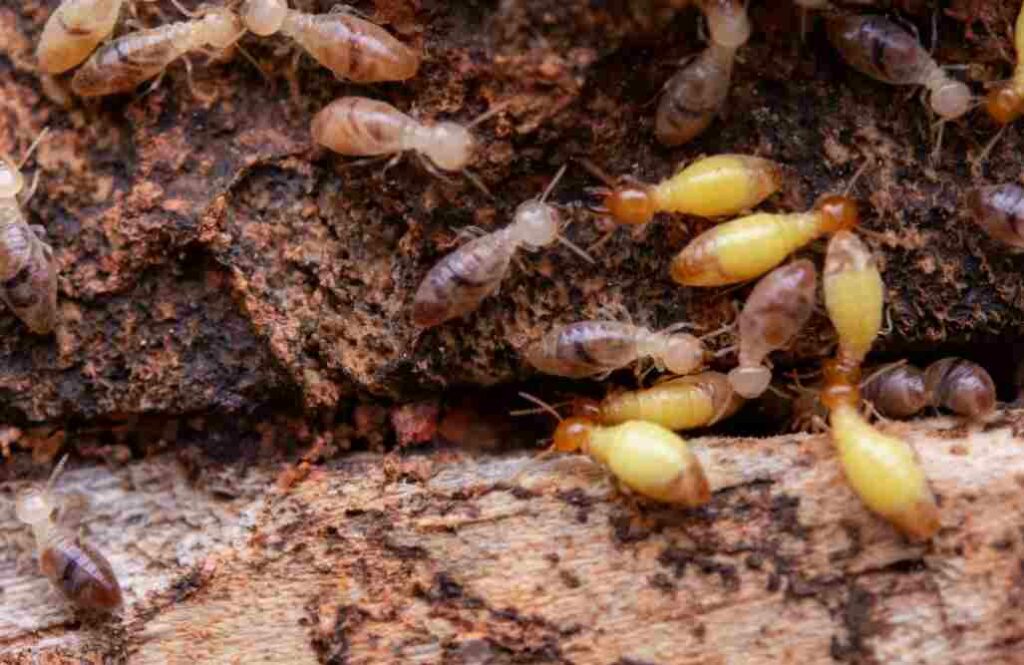
- Impalement risk – Termites’ rigid spikes and spines could stab, impale, and seriously injure Molly’s mouth, throat or intestines upon swallowing. Their bodies lack the soft-bodies safety that some water insects provide.
- Choking hazards – Particles of their tough woody shell could splinter and get caught in Molly’s mouth, gills or digestive tract. This can lead to choking or trouble breathing.
- Toxic gut microbes – Specialized protozoa and bacteria inside termite digestive systems could be harmful if ingested by the fish.
Additionally, being terrestrial insects, termites risk exposing Mollies to insecticides, fungicides, or other lawn chemicals if collected from non-aquatic environments.
In short, termites’ hard-bodied and wood-digesting nature makes them unsuitable feeders for Mollies or small tropical fish. They pose immediate health hazards and should be kept far from Molly tanks. It is never intentional to feed them, as Molly cannot be safely consumed.
Insects safe for Mollies to eat
- Mosquito larvae (Culicidae spp.) – These soft-bodied larvae can be collected from standing freshwater and provide lots of protein. They pose little risk of digestive injury.
- Aquatic sowbugs (Asellidae spp.) – Sowbugs and other isopods are crustaceans in freshwater habitats. Their bodies are easily digestible for mollies.
- Blackworms (Lumbriculus variegatus) – Blackworms are small dark worms that live in mud and are common Molly food. Their soft bodies won’t harm Molly’s digestive tract.
- Daphnia (Daphnia spp.) – Also called water fleas, these tiny crustaceans have soft exoskeletons and make great supplemental feeders.
Insects, including “ants, flies, grasshoppers, caterpillars, and mealworms”, should be avoided. Their hard outer shells may injure Molly’s digestive system during consumption. Terrestrial insects also risk exposing Mollies to pesticides, pathogens, or toxins.
When sourcing safe insects, collect them yourself from pesticide-free freshwater areas with no known contamination. Never feed Mollies insects of unknown origin. Follow these tips, and insects can provide protein while avoiding harm.
Can I feed any ants to my fish?
No. You should never intentionally feed any ants to aquarium fish like mollies. While ants are tiny, their hard exoskeletons, segmented bodies, and sharp mandibles pose significant health hazards, including,
- Physical damage – Ant body parts could lacerate gills or intestines
- Choking hazards – Tough ant shell fragments may lodge in the throat/digestive tract
- Toxicity – Some ants spray formic acid for defence and could burn gill tissue
As terrestrial insects, ants risk carrying insecticides, pesticides, unfamiliar pathogens, or other dangerous substances into an aquarium if introduced. Therefore, ants provide no nutrition or benefits, only detrimental threats if consumed by fish. They lack soft-bodied aquatic invertebrates’ safety profile.
Ensure your mollies’ health and safety; excluding ants and all land-based bugs from aquarium environments is essential. Never purposefully feed Mollies any ants or other terrestrial insects not naturally occurring in their diet. The hazards overwhelmingly outweigh any perceived benefits.
www.tinyfishtank.com
Conclusion
Mollies should not eat ants or other terrestrial insects. While aquatic invertebrates like mosquito larvae can provide nutritional benefits, land-dwelling ants and similar bugs pose multiple health threats to Mollies, including,
- Physical harm from challenging body parts
- Choking and impalement hazards
- Venom/acid toxicity
- Risk of insecticides/pesticides
- Exposure to alien pathogens
No ants or other hard-shelled insects appear in mollies’ natural freshwater diets. Small fish cannot safely consume their segmented bodies, stingers, and mouthparts. Accidental ingestion could endanger mollies.
Therefore, well-meaning Molly owners must exclude all ants and land bugs from fish environments. Intentional feeding jeopardizes Molly’s health. Instead, feed a quality pellet diet supplemented with soft-bodied mosquito larvae, daphnia, or blackworms from uncontaminated areas. This provides nutrition without putting Mollies in harm’s way. With some simple precautions, insect varieties can safely broaden Molly’s diet.
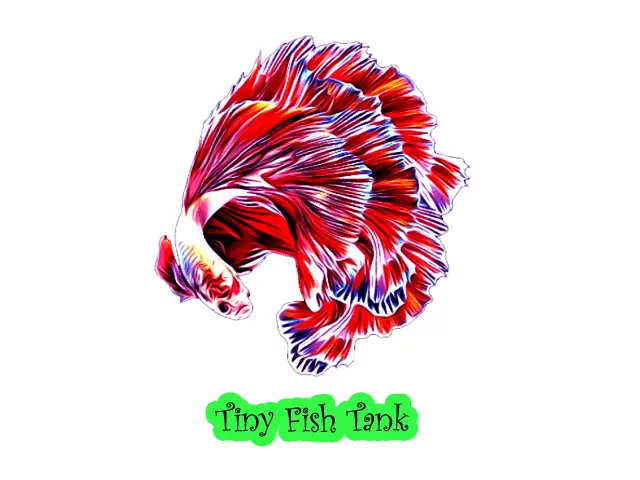
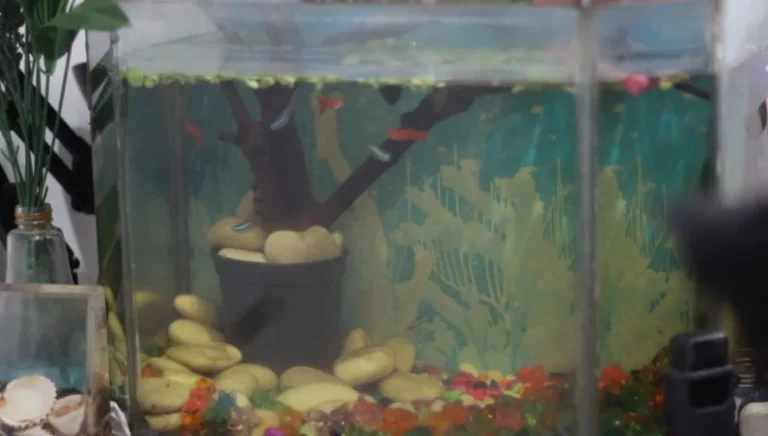
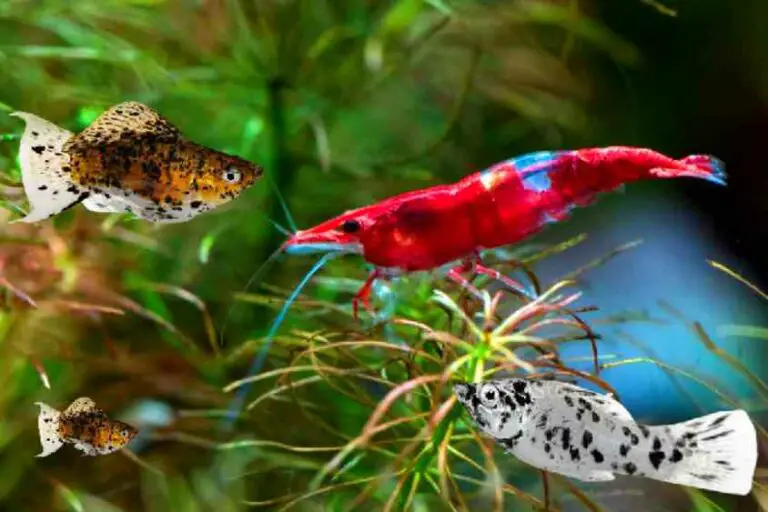
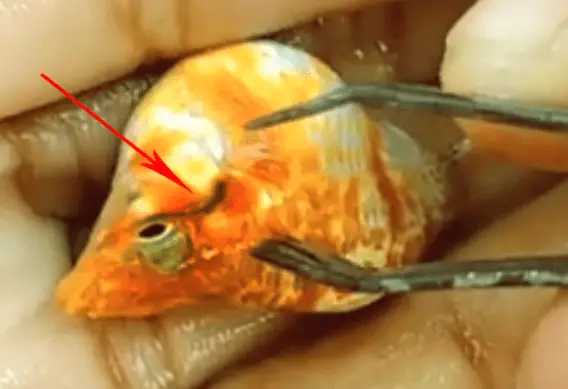
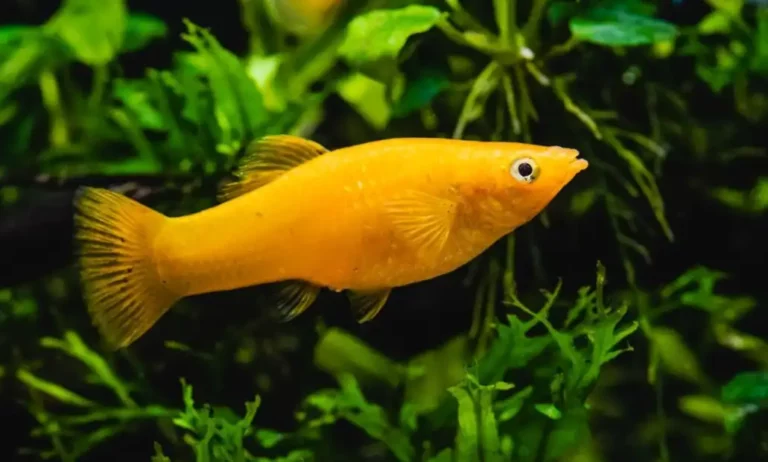
![Can Mollies Have Babies Without Males? [3 Vet advice]](https://www.tinyfishtank.com/wp-content/uploads/2023/02/Can-Mollies-Have-Babies-Without-Males.webp)
![How To Keep Your Mollies Healthy And Happy? [8 Secrets Reveal]](https://www.tinyfishtank.com/wp-content/uploads/2023/03/How-To-Keep-Your-Mollies-Healthy-And-Happy-768x470.webp)
